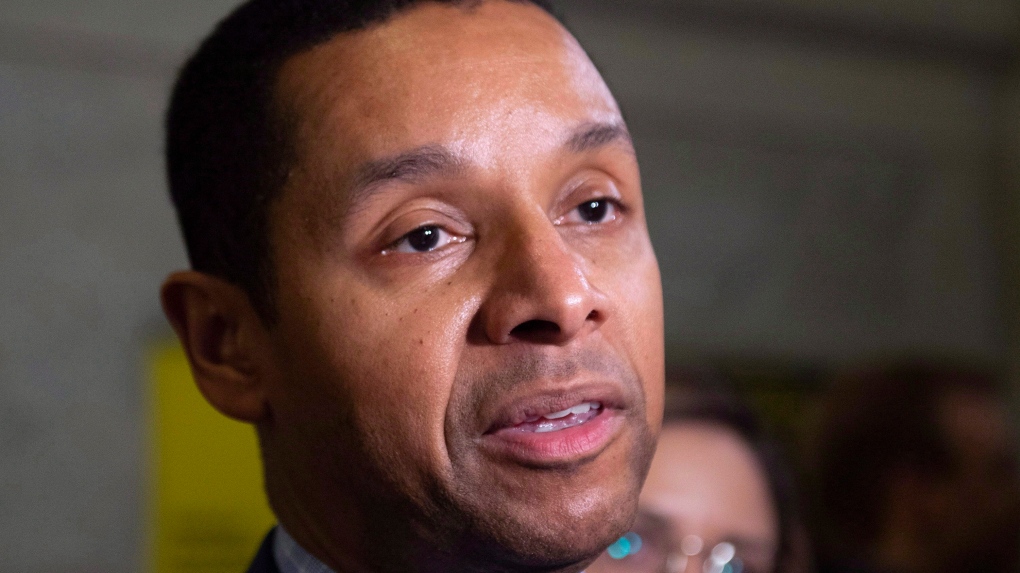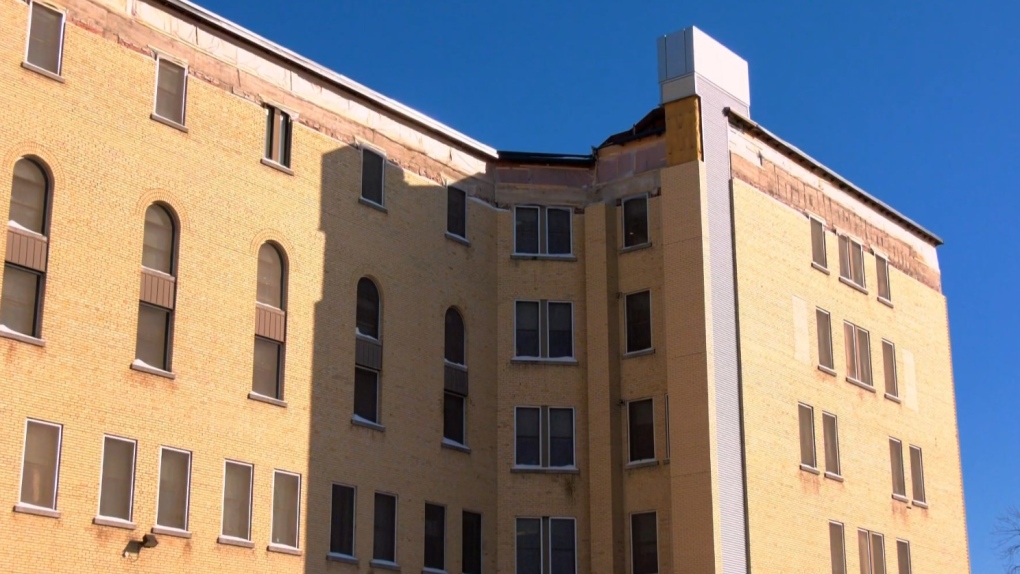Junior minister 'surprised' by COVID-19 order to confine children in group homes, is investigating
 Quebec Junior Health and Social Services Minister Lionel Carmant responds to reporters questions on their plan to raise the legal age to buy cannabois to 21 years old, Thursday, December 6, 2018 at the legislature in Quebec City. (THE CANADIAN PRESS/Jacques Boissinot)
Quebec Junior Health and Social Services Minister Lionel Carmant responds to reporters questions on their plan to raise the legal age to buy cannabois to 21 years old, Thursday, December 6, 2018 at the legislature in Quebec City. (THE CANADIAN PRESS/Jacques Boissinot)
Some kind of communication mix-up led to the long-term confinement of teenagers and younger children in group homes in early January, said Quebec's junior health minister on Tuesday.
Minister Lionel Carmant said he had only just learned of the situation CTV News reported on Friday, where teenage girls and boys were confined to windowless rooms in Laval facilities, in the name of preventing COVID-19 spread, while children as young as six were subject to similar rules.
It's unclear how many children in total across the province were subject to similar confinement under a Quebec-wide directive in place for two weeks.
Carmant said his ministry is trying to get to the bottom of how this happened -- within its own ranks, he implied, since it was the Health Ministry that published the directive for group homes, saying youth must be isolated for 10 days after an exposure to the virus.
"I'm very surprised by this news and I'm trying to investigate what happened or why the message was not passed along right," he said.
The directive is no longer in place. After two weeks, on Jan. 13, the ministry quickly changed it after social workers called an urgent meeting in Laval to alert local public health authorities to the severe mental-health effects they were seeing in the children placed in isolation.
They told CTV about youth having physical fits and needing to be held down by security staff after being kept in their rooms for days, and young children spitting on staff when they weren't allowed to leave their bedrooms.
At least two of the group homes have small bedrooms with no windows, and a mother described how her 15-year-old daughter was kept in such a room, with no natural light, around the clock for 10 days, with only 10 minutes to call home each day.
Carmant said it's a mystery to him how all this happened, since health authorities had specifically said they didn't want that kind of rule put in place in youth group homes.
"Actually, we had already had an identical problem in another region during the second wave and I had specified that we did not want it to be repeated," he said on Tuesday in response to a reporter's question, after an unrelated press conference.
"We're in the process of trying to find out what happened."
He didn't go into further detail on that case he meant. In one incident that came to light last spring, an Indigenous boy was confined to a basement in a Montreal facility for days after a COVID-19 exposure, and his teacher reported the situation only after dropping off his homework and seeing his living conditions.
Carmant said that according to the new plan, as he understood it, there was supposed to be a kind of "reverse isolation" in place at group homes, where the children or teens would all be isolated indoors together as a bubble, and staff would use extra protective equipment.

That's essentially what the new directive says, as of the Jan. 13 change: youth living at group homes are treated as a bubble.
"I asked the provincial director to investigate and provide a response," Carmant said, apparently referring to a director of youth services.
When asked by CTV News last week, a health ministry spokesperson said that the ministry had originally been treating youth group homes as primarily care environments, similar to nursing homes, but that it had shifted to seeing them as primarily "living environments."
When asked about the infrastructure itself -- especially the lack of windows -- the junior minister said he's toured many of the same facilities and is well aware of the problem, calling it "unacceptable."
"For the past three years, I've been doing regular rounds, and I know that the rooms are small, narrow, windowless," he said.
OUTCRY OVER 'INHUMAN' POLICY
Over the last few days, politicians across Quebec and at the national level voiced their concern after reading about the confined youth, calling for questions to be raised at the National Assembly.
"This is just intolerable and inexplicable," wrote Parti Québécois MNA Véronique Hivon on Twitter. She asked Carmant by name, "how did we come to this? How can we lack judgment and humanity to such an extent?"
Kathleen Weil, the Liberal MNA for NDG, also asked for an explanation, writing that she found it "shocking," and that "the minister must explain how such an inhuman government COVID directive could be imposed on such vulnerable youth."
Her caucus colleague, Enrico Ciccone, wrote that "I am speechless! When our young people are vulnerable, we have to take even more care of them, not add to [their troubles]."
Liberal MP Joel Lightbound wrote that the story made him "unbelievably sad."
On Tuesday, Québec Solidaire MNA Sol Zanetti told the QMI news agency that he'd like to see Carmant or other health authorities offer an apology to the youth affected and their families, whatever Carmant's investigation shows.
“That children were confined when they were not infected, it shows how the Ministry of Health is rigid and does not take into account mental health," he said. "The fact that this has already happened is unacceptable -- it is inexcusable.”
CTVNews.ca Top Stories

DEVELOPING Person on fire outside Trump's hush money trial rushed away on a stretcher
A person who was on fire in a park outside the New York courthouse where Donald Trump’s hush money trial is taking place has been rushed away on a stretcher.
Mandisa, Grammy award-winning 'American Idol' alum, dead at 47
Soulful gospel artist Mandisa, a Grammy-winning singer who got her start as a contestant on 'American Idol' in 2006, has died, according to a statement on her verified social media. She was 47.
She set out to find a husband in a year. Then she matched with a guy on a dating app on the other side of the world
Scottish comedian Samantha Hannah was working on a comedy show about finding a husband when Toby Hunter came into her life. What happened next surprised them both.
'It could be catastrophic': Woman says natural supplement contained hidden painkiller drug
A Manitoba woman thought she found a miracle natural supplement, but said a hidden ingredient wreaked havoc on her health.
Young people 'tortured' if stolen vehicle operations fail, Montreal police tell MPs
One day after a Montreal police officer fired gunshots at a suspect in a stolen vehicle, senior officers were telling parliamentarians that organized crime groups are recruiting people as young as 15 in the city to steal cars so that they can be shipped overseas.
Vicious attack on a dog ends with charges for northern Ont. suspect
Police in Sault Ste. Marie charged a 22-year-old man with animal cruelty following an attack on a dog Thursday morning.
Senators reject field trip to African Lion Safari amid elephant bill study
The Senate legal affairs committee has rejected a motion calling for members to take a $50,000 field trip to the African Lion Safari in southern Ontario to see the zoo's elephant exhibit.
Tropical fish stolen from Beachburg, Ont. restaurant found and returned
Ontario Provincial Police have landed a suspect following a fishy theft in Beachburg, Ont.
DEVELOPING G7 warns of new sanctions against Iran as world reacts to apparent Israeli drone attack
Group of Seven foreign ministers warned of new sanctions against Iran on Friday for its drone and missile attack on Israel, and urged both sides to avoid an escalation of the conflict.

































